 The death, in quick succession, of her father and ex-husband led Jane to finally get serious about finishing and seeking a publisher for her memoir. In Broken Whole
The death, in quick succession, of her father and ex-husband led Jane to finally get serious about finishing and seeking a publisher for her memoir. In Broken Whole, she explores dating post-divorce and comes to terms with her life’s journey.
Tell us a little about your background.
I grew up in Ann Arbor, Michigan with my parents, sister, and two brothers. I met my husband in 1988 and we married in 1990. I was 23. I graduated with a Bachelor of Science degree in piano performance from Eastern Michigan University in 1989. My father encouraged me to pursue this since I had played piano for over ten years, and I enjoyed it. I always appreciated that he did that, because it showed he supported my creativity. However, after I graduated I had no interest in teaching piano or in performing. I didn’t have the patience for the former nor the verve for the latter. I couldn’t see myself playing in malls or clubs. But I had a bachelor’s degree and that meant a foot in the door.

Playing piano
I had been a gourmet deli worker and cashier at a party store in Ann Arbor, and one of the regular patrons offered me a temporary position at the University of Michigan Hospitals while her full time secretary was on maternity leave. The temp job led to a full-time position in Neuroradiology and I worked there until I was 27. My main job was to type up medical transcripts. I was smart enough to make out the 50-letter medical terms and could type over 100 words per minute error free. The doctors loved me. But I grew antsy and bored and began searching for an internship in instructional design. I found one with a friend from church, and this launched a different phase which led to graduate school in Instructional Design, Development, and Evaluation at Syracuse University in 1994. I received my Master’s in Instructional Design, Development and Evaluation in 1995.

Graduating from Syracuse University, 1995
While I was taking classes, my long-held interest in writing arose. I had always been told I was good at writing and I loved the ability to express myself in words. I spoke with some of the full-time faculty in creative writing at Syracuse University and was able to audit a few courses. I studied with Michael Martone, Mary Karr, and Arthur Flowers. I applied for their MFA program but was not accepted. Regardless, my love of writing was ignited and I applied to The Naropa Institute (now University) in Boulder, CO. Naropa offered a contemplative lens on all aspects of learning. I was accepted there and at Emerson, but I chose Naropa because it aligned with a deeper look at life that was interesting to me.
In 1998, I was awarded the Jack Kerouac Fellowship in Prose for my short story, “Soft Lines, Creamy Features.” In 1999, three weeks before I graduated from Naropa, I gave birth to my son. My life as a writer slowed down but did not stop. I began working on a novel, which over time became a novella, and then a short story entitled “Betel Chaw.” This was a finalist with Glimmer Train in 2007, but I never published it. In 2001, I began working as an adjunct instructor in English Composition at Metro State College (now University) of Denver. I discovered a new passion and that was teaching. I loved being in front of the classroom, showing and telling students what I knew. I didn’t ever believe it was possible to love a job until I started teaching. I would come home ebullient and happy to share what had happened, but my husband didn’t support my enthusiasm. We had been unhappily together for quite some time, but years of financially supporting one another through various degrees was a bond, as was our son. After many years of going in and out of counseling and remembering my own parents’ volatile marriage, I did not want to put my son through any of this, and separated from my husband for nine months before we divorced in 2002.

Teaching at Naropa
As a woman in my mid-30s with a toddler, I needed to teach more than just a few classes to make ends meet. I received child support because my son’s father made more money than I did, but this was not enough. I taught on average seven English Composition courses per semester. In 2006, a former colleague of mine at Metro offered me a part-time job as the eLearning Coordinator where I would train and troubleshoot students and faculty on the tools of the software used for both conventional (in the classroom) and online courses. My Instructional Design degree was paying off. This position turned into full-time, and I have been doing this and continuing to teach one English Composition course since 2007.
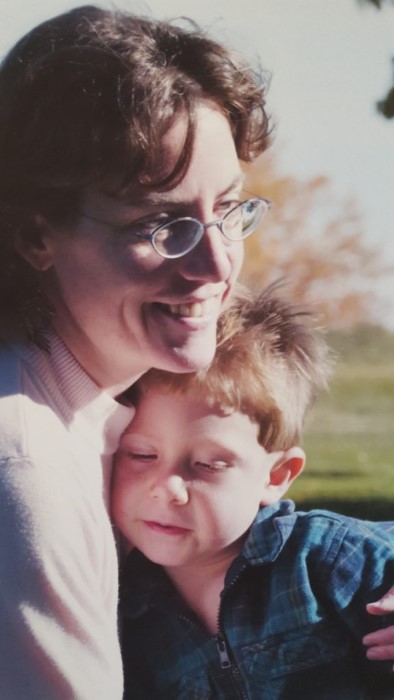
Snuggling with my son
When did you start to think about making a change?
I wasn’t expecting to make yet another change. There wasn’t an intention, but rather I felt as though I was being handed a couple of intense situations and had no choice but to respond. In July of 2014, when I was 47, my father passed away after a six-year neurological decline. Five months later, my ex-husband died from an aggressive reemergence of liposarcoma, a cancer he had battled in 2007. Each man had been a source of invalidation for me for years. While my father was a strong advocate for creativity, his expectation of excellence and perfection, along with his disappointment in my having left my ex-husband in my mid-thirties, had a strangle hold on my self-worth. My ex-husband was a stable and responsible partner but sabotaged my creativity by frequently interrupting me when I sat down to write, and would make unkind quips about any progress I made.
Each had provided a template for something to chafe against and their absence swung open a door that beckoned me to live differently. I had a freedom I’d never imagined. One of the first things that came clear was that I had an ending to the collection of essays, my memoir, Broken Whole. I had been writing it off and on for over 12 years, and its ending had arrived. Nothing was in my way anymore. I felt bold. I would seek out a publisher and close out this chapter of my life on my terms.
I began writing the collection of essays in approximately 2003, a couple of years after I had left my marriage. The writing at that point was a compass and a friend. I was hoping that by relaying what was going on, I would gain clarity. The friends I had from my MFA program at Naropa were getting on with their lives, moving back to their home states. I kept in touch through phone calls and email, but very few were close at hand. I was also the only one who had a child. Writing felt reassuring.
In the beginning, I didn’t envision a whole manuscript with a beginning, middle, and end. It wasn’t until I began sharing the stories that friends encouraged me to “write a book!” If only it felt that simple. The writing kept coming and I trusted it more than I did my decision-making at the time.

What is your next act?
I am the author of my memoir, Broken Whole: A Memoir, published by She Writes Press on November 13th, 2018. I love that this project is coming to completion. It feels like a natural end to a long personal growth process that took place over fifteen or more years.
I wrote the collection of essays as a means to clarify what was going on in my life after divorcing my ex-husband when I was 35. Many of the dating experiences were amusing. Some made me reflect and wonder what direction I was heading. I realized early on that my bumbling around with relationships was related to witnessing the volatility of my parents’ relationship, but I didn’t know how to link these without it sounding too predictable. I didn’t know, so I interspersed it in the story, unveiling the experience as I remembered it happening to me. The story is just as much about making peace with the past as it is a journey about the comedy and drama of dating.
The title went through a few iterations before Broken Whole was settled upon. Brooke Warner, publisher of She Writes Press, and I went back and forth. The title represents the trajectory of the story best. It is the idea of breaking through the past, breaking up with former perceptions of selves and the reflection of those selves from other people to arrive at an authentic self, whole, in spite of and because of all of those experiences. And, it is the process of recognizing a whole that was there all along.
How supportive were your family and friends?
Family and friends definitely enjoyed hearing the stories, many of which are in Broken Whole. Writer friends were the biggest support, especially two from Naropa: Natascha Bruckner and David Madgalene. Natascha has seen nearly every scrap of paper and underdeveloped wordsmithing of mine since 1998, when we met. She has been a cheerleader and soundboard for my many writing moods. David has also been a beacon and champion. Once, he sent me a letter full of glowing remarks about my novel, and I felt so heartened by it, that I enlarged it to the size of one wall in my living room and taped it there just so I wouldn’t forget that there was someone out there who loved my writing. He strongly encouraged that I find a reputable publisher for my memoir and that I not self-publish because the story was too strong and deserved as wide an audience as I could find.

With Natascha in New Mexico, 2018
My father was encouraging when he was alive. I’m not sure he would appreciate my making our complicated tensions public, so there is a bitter sweetness in knowing he is not alive to read it. I haven’t told other family members that I am at this stage with the book. Support from family has been capricious in regard to other situations, and it has been quite a big process moving from the isolation of writer to the public eye of author, so I have chosen not to announce this to them. Truthfully, I didn’t want to filter however they felt about the book on top of my own electrified emotions. At some point in time, I may mention it. They may find out on their own and that’s okay, but I’ll be more capable of receiving their reactions as the newness of it all retreats.
My son, 19, has been supportive of my writing and has witnessed my process of editing and getting the book published. He frequently asks about how things are going. I have spoken to him several times about the book. He’s not interested in reading it now. I appreciate that he inquires about how things are going, however. Writers are fickle, moody, and always going through literary gymnastics with development of ideas and organization of words. It can be hard to bridge the daily life of communication with the constancy of a creative process happening behind the eyes.
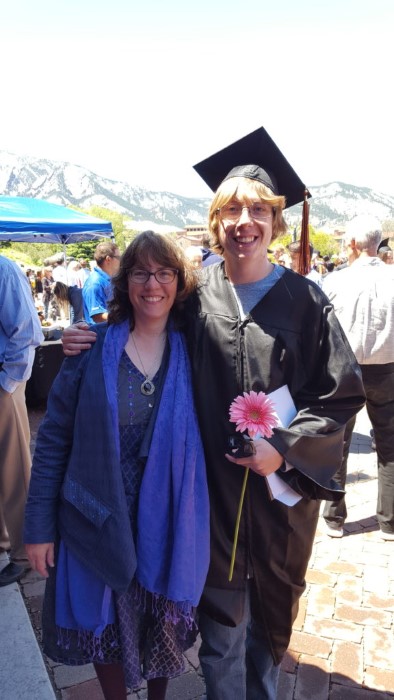
Celebrating my son’s high school graduation
What challenges did you encounter?
The writing was definitely the more difficult part of this process; I had been doing that piecemeal over several years as events arose. Committing to seeing it through required an intrinsic desire, which faltered when I felt doubt, along with the support from friends. As this was happening over many years, I needed to make the decision to continue to show up and finish.
When I was writing the memoir, I grappled with my emotions over writing about Steve, the main focus of my attention in Broken Whole. We dated off and on for 12 years after my divorce, and became engaged in 2012. The first time my feelings peaked about this was when Steve visited me at my apartment and he asked what I was writing about. At that point, he was not in any of the essays. After I chuckled and described a little bit of one of the stories, he mused out loud, “I wonder what you’re writing about me.” I didn’t say anything, but it dawned on me that I should be writing about him. Why did I care for him? Why did I keep returning to him? He didn’t treat me well consistently. This writing, these pieces, needed a center, and he was it. But the thought of writing about him and our back and forth, in and out, felt embarrassing, shameful, not to mention who was I to betray this man who had unlocked my voice, my story? I judged myself for having been drawn to him because he was incapable of maintaining any stability for himself. Volatility and retreats—outcomes from his PTSD as a Vietnam vet and career as a fireman and EMT—were frequent features of our on-again off-again relationship. In addition, I still trudged around with a heavy cloak of guilt for having left a decent man, my husband, destabilizing my son’s life in the process. On the surface of things, I had a lot going for me: two master’s degrees, a budding career—why did I feel so insecure?
I pretended I didn’t need an answer to this. Writing about it irrevocably put pressure on opening me up to look at what was lacking. It soothed and emboldened me to believe in my story, to understand how the missing pieces could come together, and to believe in creating a life I wanted.
Little by little I was stitching together the courage to keep looking, keep unraveling, keep questioning. The writing made me brave enough to speak words to others about what was going on, and then another shift happened. My story was no longer just mine. I had given it to someone else and its dimensions changed because I felt less alone with it, and this led to feeling more flirtatious and ebullient with the story, language, and shaping. It was something I could mold outside of myself. As I did so, I was beginning to see how it resonated with others’ stories, what we had in common.
It was the shared narrative that carried me through the months of doubt and fear that by writing my story I was betraying my family, Steve, and my ex-husband. Many times I believed I would never finish. Friends held me accountable. They remembered, simply by asking about the book; I knew I needed to go back, to keep writing.
I stopped writing the collection of essays in 2009, when I decided I would be okay with not finishing it. Things with Steve had reached a plateau which I could live with, and since he had become a main feature of the book by then, as his devoted partner, I couldn’t see my way clear to complete it without ruining what we had. Leaving him for the sake of the book felt wrong. I was able to finish the book once I felt relieved of the oppressive forces of my father and ex-husband in my life. Steve’s abandonment on the heels of my ex-husband’s diagnosis also relieved me of any allegiance I had formerly felt toward him. The ending wrote itself. I don’t believe the book would have been as effective if I had found a way to finish it sooner.

Hiking with my friend Kelly
What did you learn about yourself through this process?
I need to worry less about what anyone else thinks. Writing is part of that. People will make of the memoir what they wish. Judge me, love me, hate me, it will be whatever it is at this point. I stepped through the door of making my story public, so here we go. I have learned what support looks like and what it’s not, whom to invest in, and that my time is valuable and not to be wasted on people who are not authentic, or who are trapped in their fears and cannot think or feel with depth.
Looking back, is there anything you’d have done differently?
No. For the most part, I did the writing shortly after events played themselves out and jumped at the opportunity to get the memoir published once it was complete. It wasn’t an overnight process. The story didn’t dictate that it would be.

At my work space
What advice do you have for women seeking reinvention in midlife?
Take stock of the people in your life and assess honestly who is supportive and who is not. Make a list of the things and people you value and why. Changing, whether you feel as though it is within your control or not, requires an upheaval in beliefs and actions and a likely deviation from your routine. If you don’t have many people in your life who are supportive, find them. Join a group or committee at an organization you respect or for which you have a passion. Building a network is like growing a root system. It is essential that you have a strong tap root from which to establish yourself. Surrounding yourself with kindred spirits is critical. Recognize that support can come from surprising places, from people you wouldn’t expect to be in your corner. Not everyone has to share all of your interests. What matters is that they care about you genuinely.
Be patient with yourself and don’t expect all of this to happen in a few days or weeks, or even months.
Be willing to look at whether or not you are resisting your step(s) into change. Are you getting in your own way with a certain habit or guilty feelings because of what you think someone else might think about your reinvention?
Keep a journal of who you’ve come to know, and the value of new things in your life. Tracking small and large steps helps reflect back on processes that were useful and ones that didn’t work so well. Don’t be afraid to ask yourself if it was the process or the people that made a difference in how things worked out. Be honest. Success with any process hinges on how clearly you can look at what is happening as it is happening.
Help someone who is in a similar situation as yourself, maybe a few steps behind where you are currently. What you’ve learned and gained is fresh in your mind and immensely helpful to someone who is making strides.
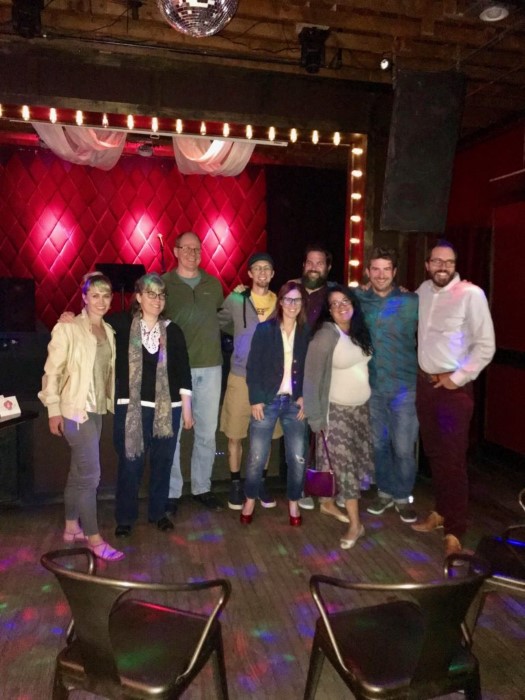
With my writing group
What advice do you have for those would-be writers?
Read, read, read. Before there were MFA or BFA programs in writing, writers learned to write by reading those who came before them. Voracious reading should be done in addition to being in a formal writing program, if you are in one. Writing and reading go hand in hand. They feed each other and provide fuel for new ideas. Read what you like and notice the patterns of how someone is delivering their story and message. Mimic this, play with it. Hand write out a page or two from a chapter of your favorite author. Notice what it feels like to copy that language. I’m not encouraging plagiarism, but rather, initially, early into writing, it helps to model successful organization of words and ideas, and especially those that you have fallen in love with.
When we are first taught to draw in an art class in elementary school, one of the first lessons is to trace a drawing we like. Handwriting out a couple of pages from an author you like is similar in that you begin to hear and feel the language that you want to have and this allows you to break off and build something unique on your own. This is also a great practice when you have the ever infamous writer’s block. It can help unstick your brain and release the spin cycle, allowing you to believe in words and your ability to organize them in your own voice, your own unique ideas, because others have done so, too.
Find a writer’s group through your local library, or a Meetup group, or the people you work with. Take a writing class through a community college or an organization devoted to writers and writing. You don’t have to obtain an MFA or a BFA to become a writer. The advantages of academic pursuits like these are making connections with people. There is no guaranteed pathway into publishing, however.
Go to bookstore websites and find out when readings are scheduled for authors. Attend these and be open to meeting people there and asking if they also write, belong to a writer’s group, etc.
Take yourself seriously and establish a routine of when you will write. Know yourself well enough to make a plan that suits your habits. If you’re a night owl, then plan to write after the kids are in bed. If early morning is your time, then set the alarm to get up an hour and a half ahead of everyone else. If your schedule is unpredictable, make notes to yourself to put on the fridge or your dresser, closet, the door, and computer about making time to write. Sometimes, it gets sandwiched in while you’re waiting at the mechanic’s or at swimming lessons for your kids.
Have something to write with everywhere you go, whether it be a small notebook, your phone, a laptop, iPad, you name it. Have something to write on or with ALWAYS.
When it comes to finding a publisher, ask friends in writing groups or at readings who their publisher is. Attend literary festivals, where publishers will usually have tables. I asked a friend of mine and she recommended She Writes Press to me. Word of mouth is best, as in most things.

Promoting Broken Whole
What resources do you recommend?
My recommendations are broken into two larger categories here. The first is that since writing is an internal process, researching and reading a lot are a big part of learning about process, voice, style, and type of writing you want to do. One of the most influential books that I love is Brenda Ueland’s If You Want to Write: A Book about Art, Independence and Spirit. She has a wonderful way of being reassuring and coaxing me to trust myself. I also love Natalie Goldberg’s Writing Down the Bones: Freeing the Writer Within
, Thaisa Frank’s Finding Your Writer’s Voice: A Guide to Creative Fiction
, Stephen King’s On Writing: A Memoir of the Craft
, Anne Lamott’s Bird by Bird: Some Instructions on Writing and Life
, Peter Elbow’s Writing without Teachers
, and Betsy Lerner’s The Forest for the Trees: An Editor’s Advice to Writers
.
The second category is in regard to having a community. Writers need readers and kindred spirits to share their work. It can take time to find a community of a few people that have the same goals and appreciation of writing. The Lighthouse Writer’s Organization in Denver, CO is an excellent resource for writers of all levels and stages to hone their skills. They offer workshops all over the metro-Denver area year-round with formats that are suitable to anyone’s schedule.
Go to your local library and inquire about writer’s groups and presentations with authors. Attending meetings and events is the best way to generate a community of people with whom you can share your writing and process. Asserting yourself at these events is important. Be friendly and open to what others have to say and chime in with your own comments to begin to get a sense of who might be a fit for you as you build a community.
Look up a community college near you and search their catalogue for when the next offering of a creative writing course is and register for it. The wonderful thing about community colleges is that they are affordable, the enrollment is open to anyone after the initial application process, there are usually course offerings in the classroom as well as online, and they are excellent for bringing people together over a shared goal.

What’s next for you?
I have a few more books I would like to write. Probably one more memoir, this one about finding my adopted brother in 2007. Another will be non-fiction about clairvoyants through time: how they were and are perceived; coming into their ability to see; the practice of being clairvoyant or psychic, today.
My first love is fiction. I have a few short stories that I would like to turn into a collection, ultimately. I am committed to assisting with the organization of a biography that Natascha Bruckner is currently working on. She has been interviewing a man who served 28 years in prison about his transformational story.
I want to paint more watercolors. It is soothing for me and completely relaxes my brain from writing. I have a collection of blank greeting cards that is gradually growing.
I would like to shift the number of hours I am spending in my full-time job and the number of hours I feel I can devote to creative endeavors.
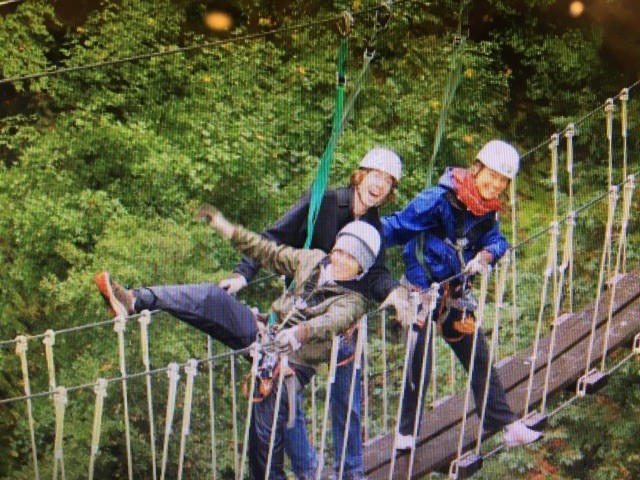
Zip lining with my son and friends
Connect with Jane Binns:
Email: janebinns@hotmail.com
Website: https://janebinnswrites.com
Book: Broken Whole: A Memoir
Facebook: https://www.facebook.com/jane.binns
Facebook Author page: https://www.facebook.com/JBBrokenWhole/
Twitter: https://twitter.com/BrokenWhole_JB
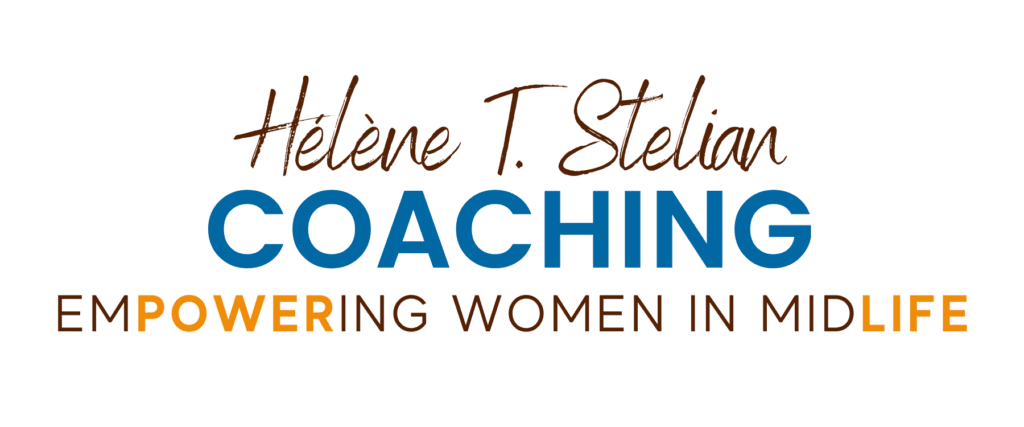

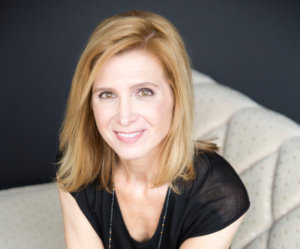
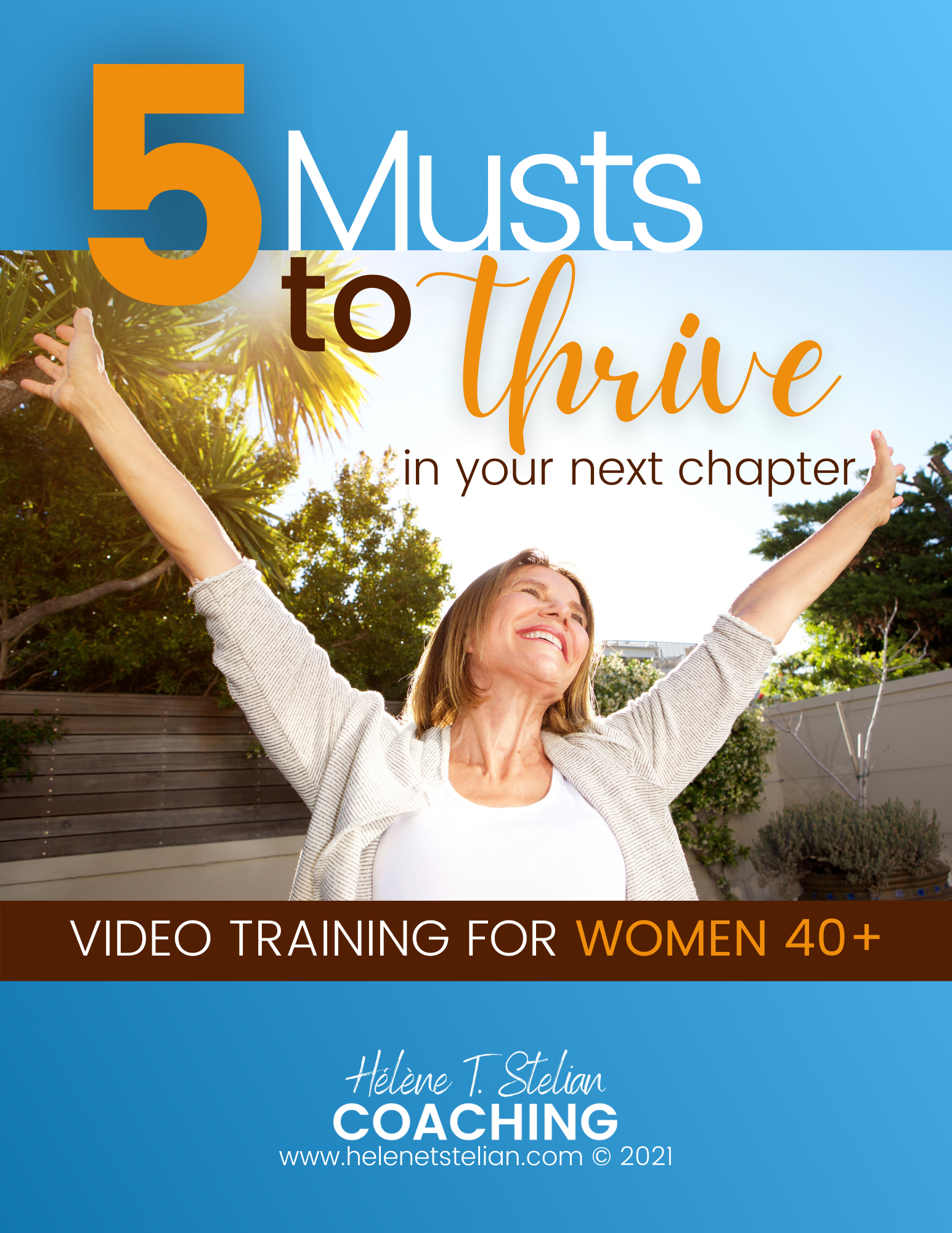



Thank you thank you thank you for this! Hélène, I so appreciate the way you publish longer interviews, with no cutting or condensing. Because who knows which nugget will resonate with readers. And in Jane’s post, I gobbled up every word. Why wouldn’t I? She’s a model of stamina, courage, and self-fulfillment. Off to buy her book now. And then, dammitall, to follow her excellent lead.
Thanks Mithra. You are an inspiration yourself!!
Thank you, Mithra! I hope my book inspires all who read it to believe in their story, their ability to let go of obstacles, and to create a life they love.
Thanks so much for introducing me to Jane, Helene! I feel like I already know her because our lives have been so parallel in so many ways!
So happy when two fabulous women connect!